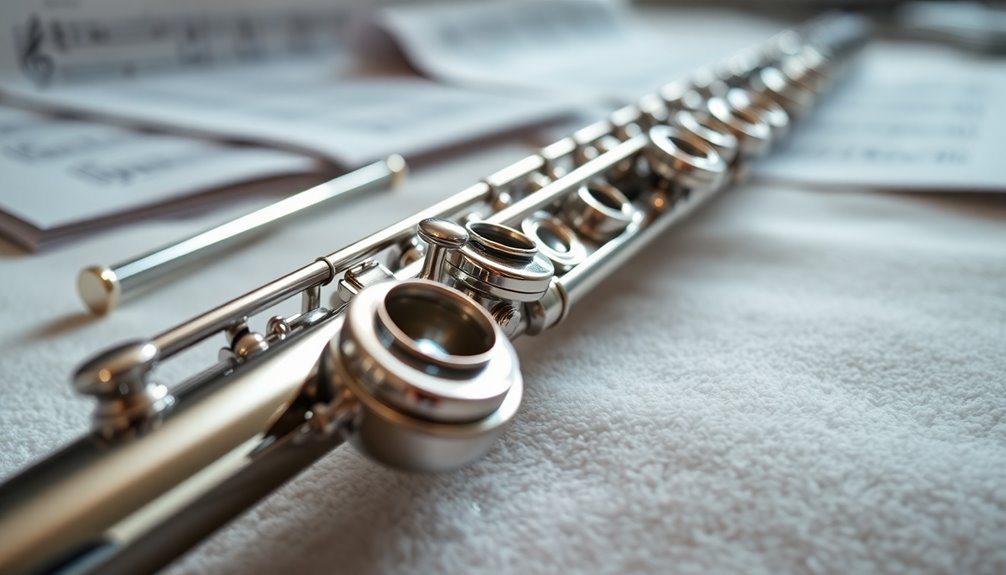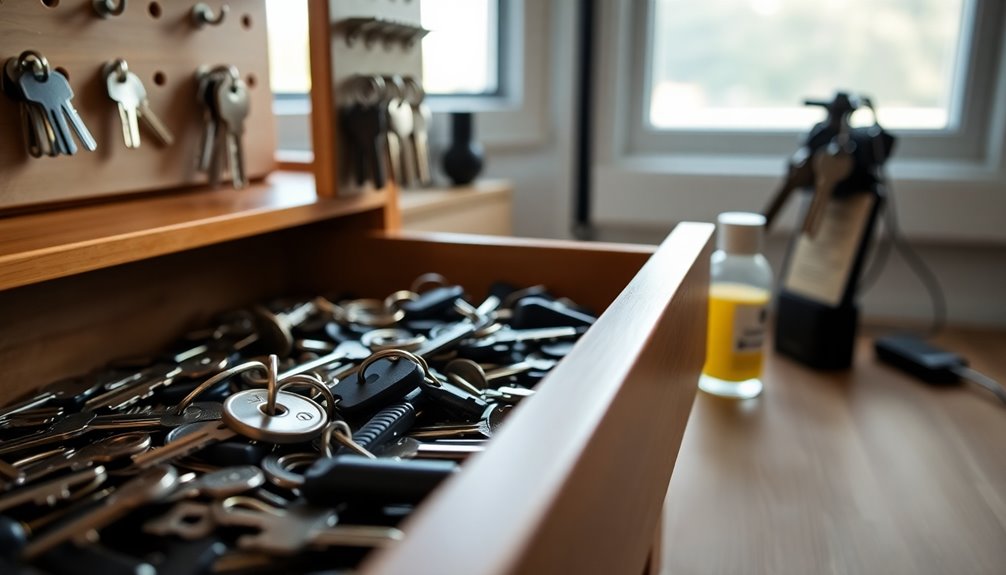To prevent key sticking issues with your flute, start by cleaning it after each session. Use a lint-free cloth on the body and a cleaning rod with cotton for the inside. Next, apply oils sparingly; key oil reduces friction while cork grease protects pads for better sound quality. Finally, store your flute in a suitable case, avoiding extreme temperatures and humidity. Make certain it's clean before storage, and maintain a controlled environment with 40-60% humidity. These simple steps will enhance your flute's performance and lifespan. For further insights on maintenance, you might discover additional strategies that can help.
Key Takeaways
- Regularly clean the flute, especially around pads and keys, to remove dirt and grime that can cause sticking.
- Apply key oil sparingly to reduce friction between moving parts and maintain smooth operation.
- Use a specialized brush to clean tone holes, ensuring unobstructed airflow and preventing key malfunctions.
- Store the flute properly in a case, avoiding extreme temperatures and humidity to protect against environmental damage.
- Inspect the flute periodically for signs of corrosion or stickiness, addressing issues promptly to maintain performance.
Regularly Clean Your Flute

How often do you clean your flute? Regular flute maintenance is vital to guarantee peak performance and prevent key sticking issues. The key to keeping your instrument in top shape lies in your cleaning routine. You should aim to clean your flute after every playing session. Use a soft, lint-free cloth to wipe down the body, which helps remove moisture and debris that can accumulate during play.
Investing in the right cleaning tools can make this process easier and more effective. A cleaning rod with a cotton cloth attached is invaluable for swabbing out the inside of the flute. This tool helps remove any moisture that can lead to corrosion or sticky keys. Additionally, a cleaning kit often includes a specialized brush for the tone holes, which is vital for maintaining airflow and sound quality.
Don't forget to check the pads and keys for any signs of dirt or grime buildup. If you notice any residue, use a small, dry brush to gently clean around the pads. Avoid using excessive moisture or cleaning solutions, as these can damage the pads and cause sticking. Regular maintenance ensures longevity and peak performance of the flute, allowing you to enjoy your music without interruptions.
Use the Right Oils

Using the right oils is fundamental for maintaining your flute's performance and preventing key sticking issues. The oils you choose can greatly impact the functionality of your instrument, guaranteeing smooth operation and longevity.
It's imperative to understand different oil types and their appropriate lubrication techniques to keep your flute in top shape.
Here are three key oil types you should consider:
- Key Oil: Specifically formulated for flutes, key oil provides a thin layer of lubrication that reduces friction between moving parts. It's important for the rods and pivot points, helping to prevent sticking.
- Cork Grease: This oil is ideal for the pads and corks on your flute. Applying cork grease keeps pads from drying out and guarantees a proper seal, which is essential for sound quality.
- Synthetic Oils: These oils offer advanced protection against wear and can withstand higher temperatures. They're a great choice if you play in varying climates, as they maintain their viscosity better than traditional oils.
When applying any oil, remember to use lubrication techniques that prevent over-application. A drop is often sufficient; too much can attract dirt and grime, leading to more issues. Additionally, regular application of cork grease is essential for maintaining airtight seals between joints, contributing to a more enjoyable playing experience.
Regularly check your keys and apply oil as needed to guarantee a smooth playing experience. By selecting the right oils and mastering proper lubrication techniques, you'll keep your flute functioning beautifully and avoid those pesky key sticking problems.
Store Properly and Safely

Proper storage practices are essential for maintaining your flute and preventing key sticking issues over time. To guarantee your instrument remains in prime condition, always store it in a high-quality flute case. A well-designed case offers protection from physical damage and environmental factors that could lead to key sticking.
When you're not playing, choose a stable storage environment. Avoid placing your flute in areas with extreme temperatures or humidity fluctuations, like near windows or heaters. Excessive moisture can lead to corrosion and sticky keys, while dryness may cause pads to shrink, affecting their seal. Aim for a controlled environment with moderate temperature and humidity levels, ideally between 40-60% humidity. Additionally, consider investing in a case made from durable materials that can withstand varying conditions.
Be mindful of how you handle your flute during storage. Always clean your instrument before putting it away to remove moisture and oils that can contribute to key issues. Use a soft cloth to wipe down the body and mechanism, guaranteeing no residue remains.
Additionally, confirm the case is kept closed and securely latched when not in use. This protects your flute from accidental bumps or drops, which could misalign keys or cause them to stick.
Frequently Asked Questions
How Can I Tell if My Flute Keys Are Sticking?
To tell if your flute keys are sticking, check the key alignment and observe the pad condition.
Press each key gently; if it doesn't return smoothly or feels sluggish, it may be sticking. Look for gaps between the pads and tone holes, which can indicate misalignment.
Additionally, inspect the pads for wear or damage, as these issues can contribute to sticking.
Regular maintenance will help guarantee your flute performs at its best.
What Should I Do if Cleaning Doesn't Resolve the Issue?
If cleaning doesn't resolve the issue, it's time to contemplate flute repair.
Think of your flute as a delicate flower; sometimes, a petal needs replacing to thrive.
Inspect the pads and springs carefully; if they're worn, you may need key replacement.
Seek a qualified technician who understands the nuances of your instrument.
You'll guarantee your flute sings beautifully again, allowing you to connect deeply with your music and fellow musicians.
Are Certain Flute Brands More Prone to Key Sticking?
Yes, certain flute brands can be more prone to key sticking due to their key materials.
Brands that use softer metals or less durable pads may experience issues more frequently.
Additionally, the design and finish of the keys can affect their performance.
You'll want to research specific brands and read reviews from other players to find one that minimizes these problems, ensuring you get a reliable instrument for your musical journey.
Can Temperature and Humidity Affect Key Performance?
Yes, temperature variations and humidity effects can greatly impact your flute's performance.
High humidity can cause moisture buildup, leading to key sticking, while low humidity may dry out pads, making them less effective.
Additionally, extreme temperature changes can cause materials to expand or contract, affecting the alignment of keys.
Keeping your instrument in a stable environment helps maintain its functionality, ensuring a smoother playing experience and prolonging its lifespan.
When Should I Seek Professional Maintenance for My Flute?
You should seek professional maintenance for your flute when you notice uneven sound, sticky keys, or visible wear on pads.
Regular flute maintenance enhances performance, extends lifespan, and guarantees your instrument remains in top condition.
If you're unsure about the timing, consider scheduling a check-up annually or after extensive use.
Investing in professional services not only safeguards your flute but also strengthens your connection to the music community and fellow musicians.
Conclusion
By following these tips, you can keep your flute in top shape and avoid key sticking issues. Regular cleaning, using the right oils, and proper storage will guarantee your instrument performs at its best. Remember, an ounce of prevention is worth a pound of cure—taking these simple steps now can save you from bigger headaches later. With a little care, your flute will sing beautifully for years to come, allowing you to focus on making music.






